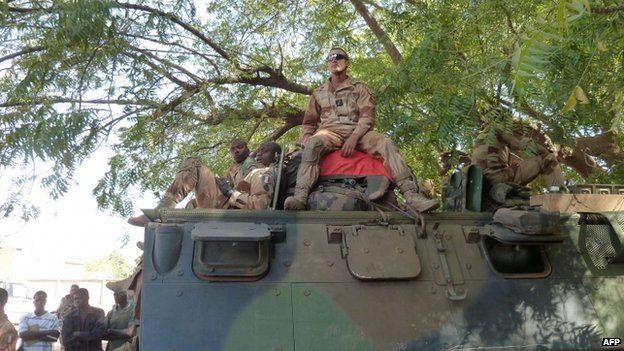Mali crisis: French confident against well-armed Islamists
- Published
- comments

We found the French army in a dusty military compound on the banks of the slow, broad Niger River, here in Markala.
There were perhaps a dozen armoured vehicles parked in the courtyard, with more grinding their way in and out every few minutes.
"The French forces are here to block and to stop the advance of the Islamist rebels," said the local French commander, who explained that for security reasons, he would only give us his first name, Frederick, and the name of his task force "Ciwara" - which is apparently a small antelope.
Lt Col Frederick explained that his immediate priority was to secure the nearby bridge - a long, narrow steel contraption - and the only crossing point over the Niger River for hundreds of kilometres.
"This is only the first part of the mission; we are waiting orders for the next part," he said, acknowledging that events on the ground were moving fast and unpredictably.
On the bridge itself, a handful of Malian soldiers sat in the shade, telling journalists that nobody - "not even tourists in peace time" - was allowed to take pictures of it.
French flags for sale
These were among the very first Malian soldiers we had seen since leaving the capital, Bamako, and driving for about five hours to the north-east.
The city itself seemed to be without any organised defence - a surprise given that it appeared to be on the brink of falling to a surprise offensive by Islamist rebels just days ago.
The first checkpoint we encountered was a few minutes outside Markala.
The countryside around here forms some of Mali's richest farmland - flat fields of corn and rice interspersed with big fruit trees.
A couple of French armoured cars drove through Markala, past a selection of French flags being sold on the roadside, and up onto the bridge, heading north.
For several days now, French airstrikes have been targeting a town called Diabaly, about 140km (87 miles) north towards the border with Mauritania.
There have also been reports of clashes in a town called Niono, about half-way between the two.
Lt Col Frederick, who is based in Chad and acknowledged having taken part in several wars in Africa, admitted that the Islamist fighters who have seized Diabaly were "a lot tougher" than any other rebel armies he had encountered on the continent.
Disarray
"But it's not really a huge problem for us," he continued.
"We know the ground. We know them. We know how they fight.
"And we have a lot of heavy arms and air strikes so for us it's no problem."
Although journalists are currently being kept back from the frontlines, it seems clear that Mali's army, having been forced into a series of humiliating retreats, is in a state of some disarray - to put it politely; and that Lt Col Frederick and his men are taking on a far more prominent frontline role than initially envisioned.
When I asked him how long he expected to remain in Mali, he smiled and replied: "I don't know.
"And if you have the answer, I'm very interested to know that."
In the same compound being used by the French, we found a handful of Malian soldiers, and in an upstairs office, was Col Cheick Amala Sidibe, commander of the Seventh Region.
"We know they are strong. They don't respect the human rights. It's a problem," he conceded, when I asked him why the Islamists had captured the garrison town of Diabaly with such apparent ease.
But like his French counterpart, Col Sidibe was adamant that the lightly-armed Islamists would soon be defeated.
"We have faith… and we have the French with us.
"They are doing a good job. Together we can do it quickly… It is not a problem for us to win."